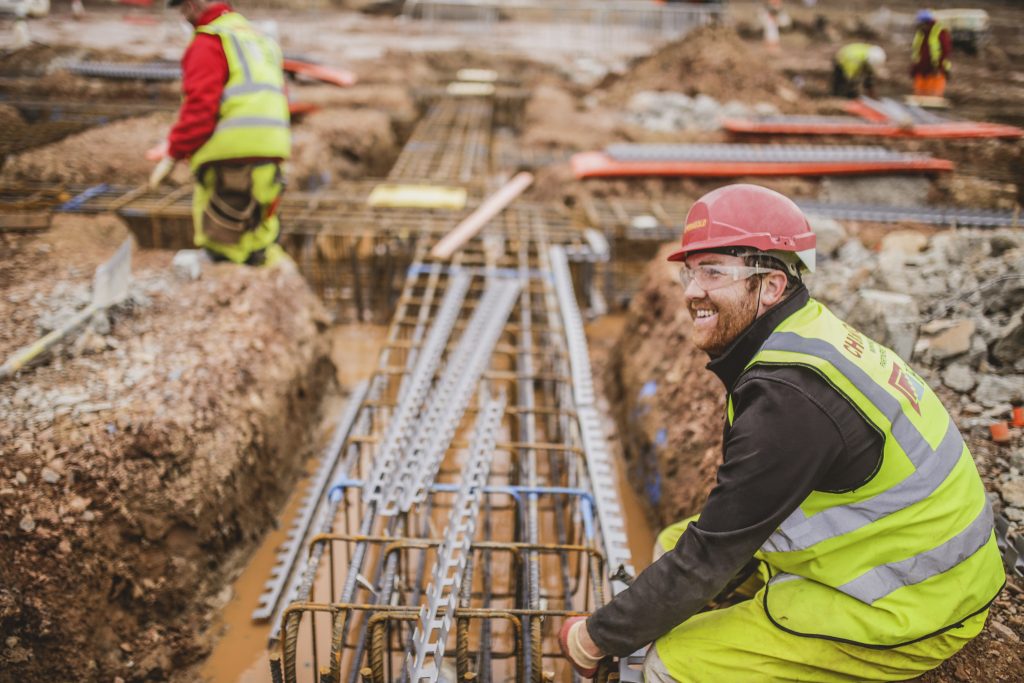News - Construction News
Building the next generation

We are facing a skills crossroads in our industry, says Richard Martin, Managing Director, Churngold Construction. As a generation of experienced professionals moves toward retirement, we’re seeing a growing mismatch between the work that needs doing and the workforce available to do it. The Office for National Statistics has repeatedly highlighted that the average age of UK construction workers is increasing, with a significant proportion now aged over 50. At the same time, too few young people are entering the sector to fill the gap.
If we’re serious about protecting the future of construction, we need to talk openly and practically about training not just as a solution to the skills shortage, but as a long-term investment in the sustainability, professionalism and productivity of our workforce.
At Churngold Construction, we’ve long recognised the value of investing in people. As we mark our 40th anniversary, we remain committed to developing talent through structured, hands-on learning, supported by experienced mentors and a real pathway to progression. But as the nature of our work evolves, so must the way we attract and train the next generation.
The standard apprenticeship model has its place but it doesn’t always offer the flexibility or earning potential needed to attract and retain the best talent. That’s why Churngold has moved away from the traditional apprenticeship route in favour of a three-year trainee programme designed around the realities of site life and project delivery.
We offer structured training for Groundworkers, Engineers, Quantity Surveyors, Plant Operators and Estimators, with sensible pay from day one and a clear path to progression. Our trainees are treated as valued members of the team, not just juniors shadowing others. They’re supported by dedicated mentors, trained in a live site environment, and given opportunities to develop both practical skills and commercial awareness. This model gives us greater control and flexibility, allowing us to tailor learning to real-world needs rather than generic frameworks. It also allows trainees to earn a fair wage while they learn, helping to break down one of the major barriers young people face when considering a career in construction.
The skills shortage isn’t theoretical. It’s already affecting project delivery, cost certainty and programme timelines across the country. Roles in groundworks, plant operation, environmental compliance and digital construction are particularly hard to fill.
Our approach is to build the workforce we need from within. Many of our trainees progress quickly into supervisory, technical or management roles bringing with them a deep understanding of both the practical and strategic demands of modern construction. This in-house growth supports continuity across our teams and helps maintain the quality and accountability we pride ourselves on. Crucially, the structure of our programme builds loyalty. When people are supported, fairly paid, and shown a clear route to progress, they stay – and grow.
To attract young people, we need to shift perceptions. Construction is not a dead-end job, nor is it just about physical labour. It’s a sector rich in opportunity, innovation, and visible impact and while AI might be changing the landscape, many positions will be secure for years to come.
A well-structured training programme can offer:
- Strong earning potential from the outset
- Tangible career progression and role diversity
- Job satisfaction from working on projects that shape the world around us
- Exposure to growing specialisms, from sustainable construction to digital modelling
We also need to show that construction offers far more than just one path. Our industry needs surveyors, engineers, data analysts, planners, and digital specialists as much as it needs site operatives. Good training helps young people understand how far they can go and how to get there. Solving the skills crisis will take effort and alignment across the sector. It requires contractors to offer more than just placements, to provide real mentoring, investment and long-term career planning. Clients and consultants also have a part to play, by supporting procurement approaches that prioritise local employment and meaningful trainee opportunities.
At Churngold, we see our trainees not just as learners but as future leaders. They bring fresh ideas, energy, and adaptability, qualities that are essential as our industry evolves. If we want a construction sector that’s resilient, rewarding and ready for the future, then it’s time to treat trainee development as a core business strategy, not just a tick-box initiative. Because building the next generation starts with how we choose to train them today.
For more information visit the Churngold website.
Article submitted by Richard Martin, Managing Director, Churngold Construction
Related Articles
More News
- Plan to kickstart onshore wind revolution
17 Jul 25
Onshore wind is set to accelerate over the second half of the decade.
- Homes England supports Greencore Homes with new sustainable homes
16 Jul 25
Homes England will provide funding to support the delivery of Milton Heights.
- Reforms to Building Safety Regulator to accelerate housebuilding
15 Jul 25
Delays to building new high-rise homes will be unblocked through a new package of reforms






